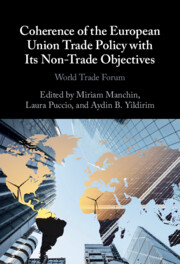Book contents
- Coherence of the European Union Trade Policy with Its Non-Trade Objectives
- Coherence of the European Union Trade Policy with Its Non-Trade Objectives
- Copyright page
- Contents
- Contributors
- Introduction
- 1 European Union Trade Policy and Non-Trade Issues
- 2 The European Union
- 3 Export Credit Agencies
- 4 The Effects of Non-Trade Provisions in Trade Agreements on Bilateral FDI
- 5 How EU Trade and Cooperation Policies Stimulated China to Go Green
- 6 The Role of Domestic Factors in the EU’s Governance of Labour Standards through Trade
- 7 EU Trade Agreements and Non-Trade Policy Objectives
- 8 Trade, the G20 and the EU
- 9 Enhancement of the European Parliament’s Monitoring for Better Coherence between Trade Policy and NTPOs
- Conclusion
- Index
- References
6 - The Role of Domestic Factors in the EU’s Governance of Labour Standards through Trade
Published online by Cambridge University Press: 19 October 2023
- Coherence of the European Union Trade Policy with Its Non-Trade Objectives
- Coherence of the European Union Trade Policy with Its Non-Trade Objectives
- Copyright page
- Contents
- Contributors
- Introduction
- 1 European Union Trade Policy and Non-Trade Issues
- 2 The European Union
- 3 Export Credit Agencies
- 4 The Effects of Non-Trade Provisions in Trade Agreements on Bilateral FDI
- 5 How EU Trade and Cooperation Policies Stimulated China to Go Green
- 6 The Role of Domestic Factors in the EU’s Governance of Labour Standards through Trade
- 7 EU Trade Agreements and Non-Trade Policy Objectives
- 8 Trade, the G20 and the EU
- 9 Enhancement of the European Parliament’s Monitoring for Better Coherence between Trade Policy and NTPOs
- Conclusion
- Index
- References
Summary
This chapter analyses the role of domestic factors in the ability of the EU to promote non-trade policy objectives through formal trade policies and market integration as two distinct governance approaches. Focusing on labour standards, the chapter examines how economic and political factors in developing economies influence the ability of key stakeholders – governments, businesses and labour organizations – to undermine or reinforce EU governance efforts. It uses a combination of regression and comparative case analysis to assess associations and understand processes on the ground. The quantitative analysis shows that improvements in labour standards are closely associated with (1) labour standards in key export markets, (2) the technological sophistication of exports, (3) state capacity and (4) the freedom of civil society organizations. Comparative analysis of how differences in state strategies and capacity, key export destinations and the strength of labour organizations across Moldova and Morocco set in place divergent pathways of improvements in labour standards allows us to shed more light on the potentials and limitations of EU governance efforts.
- Type
- Chapter
- Information
- Coherence of the European Union Trade Policy with Its Non-Trade ObjectivesWorld Trade Forum, pp. 148 - 179Publisher: Cambridge University PressPrint publication year: 2023

